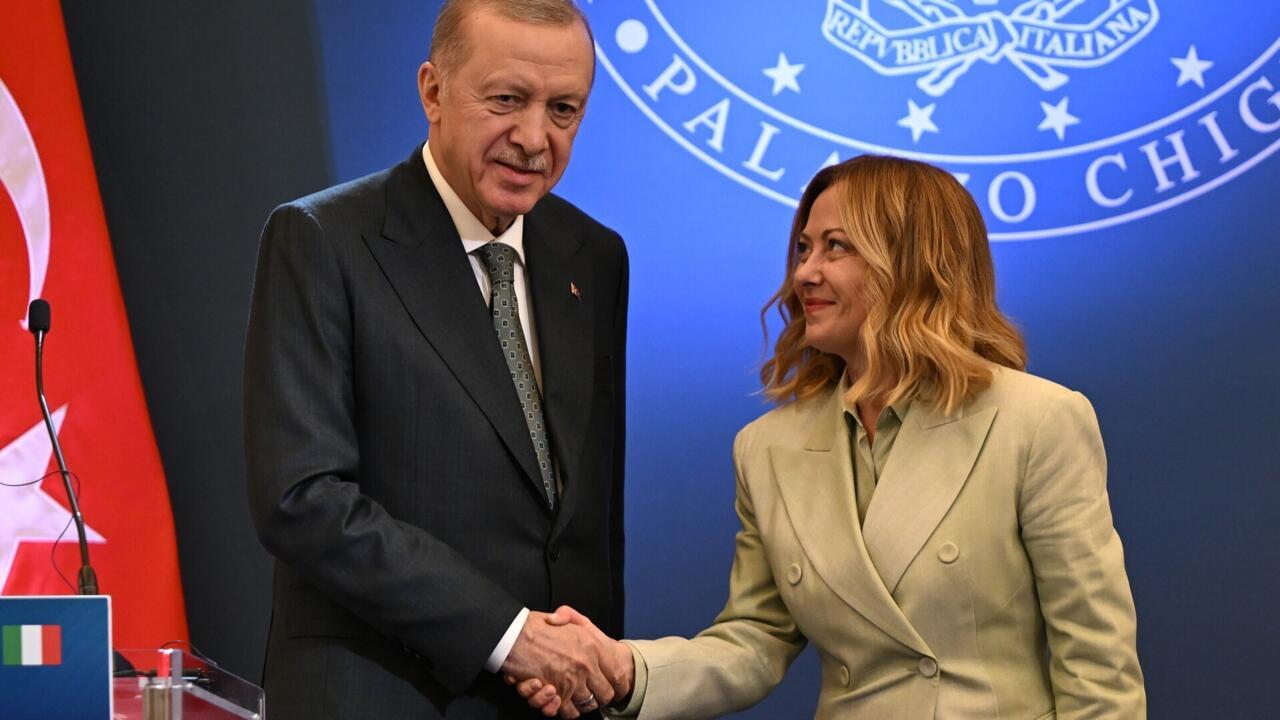Turkey and Italy are working more closely on migration, energy and regional influence as they seek to shape Libya’s political future. Both see the North African country as a key shared interest and are moving to consolidate their positions in the conflict-torn but energy-rich eastern Mediterranean.
Earlier this month, the leaders of Italy, Turkey and Libya’s Government of National Accord (GNA) met in a tripartite summit – the latest sign of growing cooperation between the three Mediterranean nations.
“Turkey and Italy have both differing interests, but interests in Libya,” explains international relations professor Huseyin Bagcı of Ankara’s Middle East Technical University.
“Particularly, the migration issue and illegal human trafficking are big problems for Italy, and most of the people are coming from there [Libya], so they try to prevent the flow of migrants.
“But for Turkey, it’s more economic. And Libya is very much interested in keeping the relations with both countries.”
Turkey and Italy consider teaming up to seek new influence in Africa
Migration, legitimacy concerns
Turkey is the main backer of Libya’s GNA and still provides military assistance, which was decisive in defeating the rival eastern-based forces led by strongman Khalifa Haftar. An uneasy ceasefire holds between the two sides.
Libya security analyst Aya Burweilla said Turkey is seeking Italy’s support to legitimise the Tripoli government, as questions grow over its democratic record.
“What it means for the Tripoli regime is very positive. This is a regime that has dodged elections for years,” she says.
“Their job was to have democratic elections, and one of their ways to make sure they stay in power was to get foreign sponsors, like Turkey… Now, with this rubber stamp from Meloni in Italy, they can keep the status quo going at the expense of Libyans.”
Years of civil war and political chaos have turned Libya into a major hub for people smugglers. Italian Prime Minister Giorgia Meloni, elected on a pledge to curb irregular migration, sees stability in Libya as key to that goal.
“The migration issue has become very, very urgent in general for Europe, but of course for Italy too,” says Alessia Chiriatti of the Institute of International Affairs, a think tank in Rome.
Trump and Erdogan grow closer as cooperation on Syria deepens
Mediterranean ambitions
Chiriatti said Meloni’s partnership with Turkey in Libya also reflects broader foreign policy goals.
“There is another dimension – I think it’s directly related to the fact that Italy and Meloni’s government want to play a different role in foreign policy in the Mediterranean space,” she says.
“Italy is starting to see Africa as a possible partner to invest in … But what is important is that Italy is starting to see itself as a new player, both in the Mediterranean space and in Africa, so in this sense, it could have important cooperation with Turkey.”
She points out that both Italy and Turkey share a colonial past in Libya. That legacy, combined with the lure of Libya’s vast energy reserves, continues to shape their diplomacy.
Ending the split between Libya’s rival governments is seen as vital for stability. Moscow’s reduced military support for Haftar, as it focuses on its war in Ukraine, is viewed in Ankara as an opening.
“Russia is nearly out, and what remains are Turkey and Italy,” says Bagcı.
He added that Ankara is making overtures to the eastern authorities through Haftar’s son Saddam, a senior figure in the Libyan military.
“The son of Haftar is coming very often to Ankara, making talks. It’s an indication of potential changes… But how the deal will look like I don’t know, we will see later. But it’s an indication of potential cooperation, definitely.”
Turkey steps into EU defence plans as bloc eyes independence from US
Shifting alliances
Libya was discussed when Turkish Foreign Minister Hakan Fidan met Egyptian President Abdel Fattah el-Sisi in Cairo on Saturday.
Sisi backs Haftar’s eastern government. Libya had been a source of tension between Turkey and Egypt, but with relations thawing, both say they will work together on the country’s future.
Turkey’s position in Libya is strengthening, says Burweilla.
“Saddam is pro-Turkey – there is a huge difference between son and father – and the younger generation is pro-Turkey,” she says.
Such support, Burweilla said, stems from Ankara allowing Libyans to seek sanctuary in Turkey from fighting in 2011, when NATO forces led by France and the United Kingdom militarily intervened against Muammar Gaddafi’s regime.
“I think the Europeans underestimated the political capital that gave Turkey. Turkey is winning the game in Libya,” Burweilla says.
She adds that Ankara’s rising influence is also due to a shift in tactics towards the east.
“What they [Ankara] realised was that you can’t conquer the east of Libya by force; they tried and they failed. And the Turkish regime is very much motivated by business… They don’t care about anything else, and they’ve realised they want to make a business,” Burweilla says.
They’ve reached out more to the east, and the east, in turn, has realised that if they don’t want to be attacked by Turkey and its mercenaries, they need to make peace with Turkey as well.”
